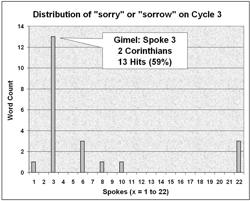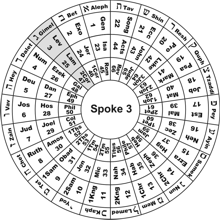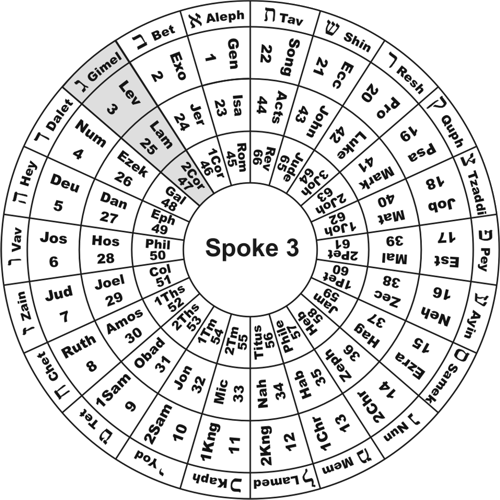Zion hath No Comforter!
How doth the city sit solitary, that was full of people!
how is she become as a widow! she that was great among the nations, and princess among the provinces,
how is she become tributary! She weepeth sore in the night, and her tears are on her cheeks: among
all her lovers she hath none to comfort her: all her friends have dealt treacherously
with her, they are become her enemies.
Lamentations 1:1f (Spoke 3, Cycle 2)
The Book of Leviticus introduces the promise of Fellowship with God in
conjunction with a warning of Punishment from God. This duality maps perfectly onto the Second and Third Books of Spoke 3.
Lamentations records the Punishment, and 2 Corinthians exemplifies and expands upon the
Promise. This polarity manifests with particular clarity in the use of the word comfort in these two Books.
Just as the promise of God's comfort greatly dominates the opening passage of 2 Corinthians, so
Lamentations explicitly declares it to be missing!
- She weepeth sore in the night, and her tears are on her cheeks: among all her lovers she hath none to comfort her Lam 1:2
- Her filthiness is in her skirts; she remembereth not her last end; therefore she came down wonderfully: she had no comforter Lam 1:9
- For these things I weep; mine eye, mine eye runneth down with water, because the comforter that should relieve my soul is far from me Lam 1:16
- Zion spreadeth forth her hands, and there is none to comfort her Lam 1:17
- They have heard that I sigh: there is none to comfort me Lam 1:21
Lamentations is like a photographic negative of the great comfort revealed in
2 Corinthians (see The God of All Comfort).
Great Sorrow!
But I determined this with myself, that I would not come again to you in heaviness.
For if I make you sorry, who is he then that maketh me glad, but the same which is made sorry by me?
And I wrote this same unto you, lest, when I came, I should have sorrow from them of whom I ought to rejoice;
having confidence in you all, that my joy is the joy of you all. For out of much affliction and anguish of heart
I wrote unto you with many tears; not that ye should be grieved, but that ye might know the
love which I have more abundantly unto you.
2 Corinthians 2:1ff (Spoke 3, Cycle 3)

The great sorrow expressed in Lamentations is strangely reflected in 2 Corinthians which has been called
the "epistle of tears" because of Paul's overflowing emotional anguish as he strove for the souls of the people in
that city. This epithet is entirely appropriate and is borne out in the distribution of the words sorry and
sorrow on Cycle 3. The extreme peak in 2 Corinthians tells it all. This shows the symmetry of sorrow and comfort,
and forms a profound link to Lamentations, the "saddest book in existence."
|



